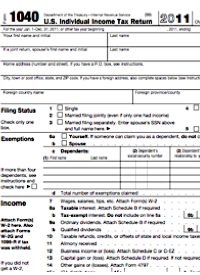
While GOP presidential candidates Mitt Romney and Newt Gingrich release their 2010 tax returns, nearly 100,000 federal workers owe more than $1 billion in unpaid taxes in 2010. Congressional staffers owed $10.6 million in 2010, adding to a growing portion of the approximate $1 billion total owed by all civilian federal employees, which include military, postal service, executive branch, and congressional workers.
While the number of tax delinquent federal employees has gradually declined since 2004, the total dollar amount of delinquencies has surged: In 2004, there were 102,794 tax delinquent employees, owing a total of $599.8 million; in 2010, the number of employees shrank to 98,291, but the amount owed spiked to $1.03 billion. The Washington Post elaborated:
on Capitol Hill, 684 employees, or almost 4 percent, of the 18,000 congressional staffers owed taxes in 2010 a jump of 46 workers from 2009. Four percent of House staffers owed $8.5 million and 3 percent of Senate employees owed $2.1 million, the IRS said.
At the Executive Office of the President encompassing 1,800 employees of the West Wing, the Office of Management and Budget, the National Security Council and the Office of U.S. Trade Representative, among others 36 staffers, or 2 percent, owed a $833,970. The amount owed increased by almost $3,000 from the previous year.
According to Internal Revenue Service data, four percent of U.S. Postal Service workers, or 25,640 employees, owe $269.6 million; three percent, or about 2,000 employees, at the Social Security Administration owe approximately $20.1 million in back taxes. However:
Civilian employees of the Defense Department the federal governments largest employer fared the worst. More than 25,600 workers at the departments of the Army, Air Force and Navy owed a combined $225.7 million, while another 4,600 civilian Pentagon employees owed $39.4 million.
Among uniformed military personnel, 2 percent of active-duty troops and 2 percent of reservists owed a combined $339 million. Three percent of the nations 2.1 million retired military personnel owed $1.6 billion, according to IRS records.
Congressional Republicans, led by Rep. Jason Chaffetz (R-Utah), unveiled legislation last year that would authorize the firing of federal employees who are “seriously delinquent” on their taxes (although there were exceptions for individuals suffering from certain degrees of financial hardship). “If you work for the federal government and you don’t pay your taxes, you should be fired,” Chaffetz said in a statement. “It is totally unacceptable to live on the federal payroll and not pay your taxes. The Obama administration has totally ignored this cheating. Congress should pass my bill and hold federal workers accountable.”
Further, Chaffetz introduced a second bill that would prohibit anyone with serious tax delinquencies from securing a federal government contract or grant. Competition for such taxpayer-subsidized funds is fierce, he affirmed, so no one who abstains from paying a federal tax obligation should benefit from federal dollars.
Sen. Tom Coburn (R-Okla.) introduced similar legislation in 2010 to disqualify delinquent taxpayers from federal employment, with the intent to make lawmakers more transparent about their own tax debts to local, state, and federal governments. Similar to Chaffetzs bill, Coburns legislation would not apply to employees who made oversights in their taxes but agreed to pay them, or for those paying taxes under an installment plan, among other exceptions.
“Legislators and government employees should not be exempt from the laws they write and enforce,” Coburn said when introducing the bill. “The very nature of federal employment and the concept inherent to ‘public service’ demands those being paid by taxpayers contribute their fair share of taxes. They should lead by example.” Coburn asserted that requiring the IRS to collect unpaid taxes from federal workers would save taxpayers a total of $3 billion.
A committee approved Chaffetzs bill last year, but Coburns is still awaiting a review by a Senate panel. “Congress must send the message that those who deliberately and willfully dodge federal tax obligations should not expect to collect a taxpayer-funded paycheck,” Chaffetz wrote in a March 2011 article for the Daily Caller. “At a time when this country is nearly $14 trillion in debt and many Americans are struggling to find work, the federal government need not tolerate tax evasion within the federal workforce.”
Illustration above and below: IRS Form 1040



